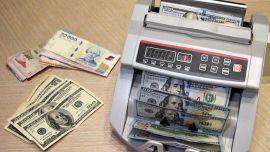A thermometer of the situation of culture in Argentina, the Buenos Aires Book Fair this year features the decline of the publishing industry due to the economic crisis and controversy over the ultimately cancelled “show” of President Javier Milei.
The iconic Argentine book industry has experienced a severe adjustment by ultra-liberal Milei since December to contain an annual inflation of nearly 290 percent, at a time when half the population falls under the poverty line.
“In January, bookshops spoke of a 20-percent year-to-year decline of sales, in February it was already 25 percent and in March nearly 40 percent”, said Juan Pampín, president of the Argentine Chamber of Books and director of publishing house Corregidor.
Federico Giménez, from publisher Ciccus, recalled that the peso’s 50-percent devaluation in December made the price of paper more expensive, as it is dollarised and handled by only two companies, which contributed to the price increase.
In the retail sector the outlook is similar and traders manoeuvre between increases to attempt to keep their clientele, even in the most expensive neighbourhoods of Buenos Aires.
“Sales have dropped a lot, there are customers who used to come more often. Now they ask questions but they don’t buy”, said Santiago Martínez, who owns the bookshop El Gato y la Luna in the affluent neighbourhood of Núñez, Buenos Aires.
Books cost nearly US$20, as against a minimum wage of some 200,000 pesos (US$225).
In addition to the dive in sales, the organisers of the Book Fair have accused the Government of attacking culture and withdrawing funds from the 48th edition of this annual gathering.
Alejandro Vaccaro, president of Fundación El Libro, which organises the Fair, criticised “the ruthless attack on culture” by Milei’s Government at the opening on April 25, whereas writer Liliana Heker wondered at the opening speech: “Does it make sense to have this new Book Fair in a country where poverty and destitution are growing on a daily basis?”.
One of the highlights this year was the presentation of Milei’s eighteenth book, “Capitalismo, socialismo y la trampa neoclásica (Capitalism, socialism and the neoclassic trap)” (Planeta), at a massive event with giant screens like a concert.
Yet the President cancelled his show scheduled for May 12 on Wednesday and accused the organisers of “hostility” and “attempts at sabotaging” his event.
In response, Vaccaro said on the radio on Thursday that the cancellation was actually due to the impossibility of meeting the President’s impossible demands: “They asked for 5,000 free tickets”. The President’s Office denied this assertion and a ruling party deputy called the fair a “leftie” event.
The tension between the Book Fair and the Government started when the latter decided not to set up the usual stand for the Culture secretariat at the event, claiming cutbacks.
Milei postponed his book presentation for May 22 at the Luna Park arena, with a capacity for some 8,000 people.
Ezequiel Martínez, director general of Fundación El Libro, stated that organisers are not in a position “to assume the security and everything involved in a presidential visit. It was the first time a seating president would come to present a book”.
However, “the fair doesn’t depend on Milei coming to present his book”, added the organiser of the event attended by 1,500 sellers from 40 countries.
The Buenos Aires Book Fair, which ends on May 13, is one of the biggest book-selling events in the Spanish-speaking cultural world.
“The Argentine industry was the first one in Latin America to start to make translations, which led, for instance, to the end of neutral Spanish in editions and the addition of more Latin American terms”, specified Pampín, who stressed the regional importance of the sector.
“This was then copied, in the best sense of the word, and well done, Chile, Mexico and Colombia, among other countries”, Pampín continued.
“Argentina has, by far, the largest number of bookshops per inhabitant in Latin America”, the bookseller claimed, by estimating that in Buenos Aires there are between 1,000 and 1,200.
--TIMES/AFP

















Comments